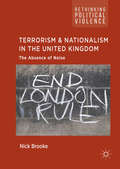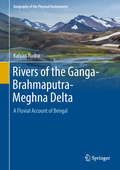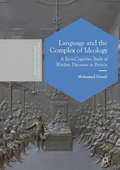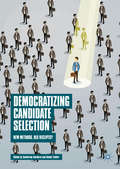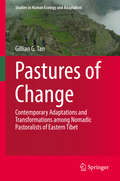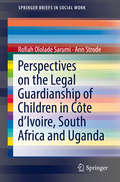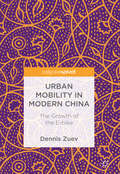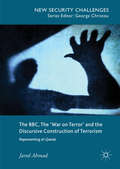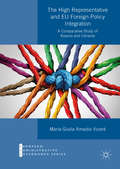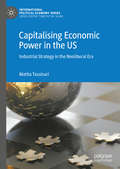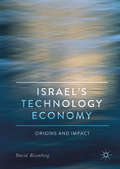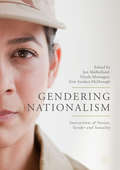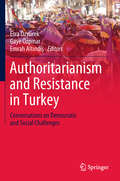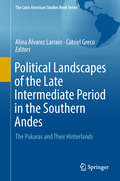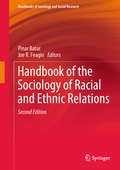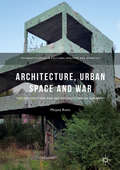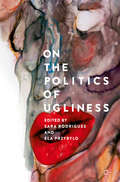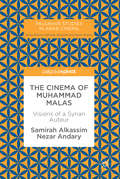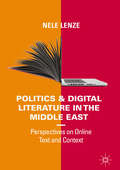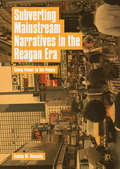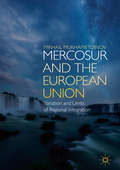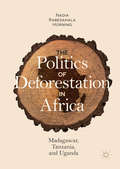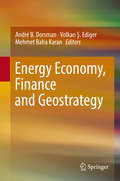- Table View
- List View
Terrorism and Nationalism in the United Kingdom: The Absence Of Noise (Rethinking Political Violence Ser.)
by Nick BrookeThis book makes a timely contribution to the analysis of nationalism and terrorism, and also the absence of terrorism. It proposes to analyse why Scottish, Welsh and English nationalism has never had as significant a turn to political violence as the case of Irish nationalism has. This will answer a question which is too rarely asked ‘why do certain groups not turn to terrorism?’ Nick Brooke makes an important contribution to debates on nationalism in the United Kingdom, as well as to debates on the relationship between nationalism and terrorism. Furthermore, the text provides complete narrative accounts of nationalist terrorism in Scotland, Wales and England, and considers how recent political developments impact the likelihood of further nationalist terrorism.
Rivers of the Ganga-Brahmaputra-Meghna Delta: A Fluvial Account Of Bengal (Geography of the Physical Environment)
by Kalyan RudraThis is the first comprehensive book on the rivers of the Ganga-Brahmaputra-Meghna delta. This volume covers all aspects of this highly populated region including land conflicts and environmental impacts such as the Indo-Bangladesh conflict over sharing of trans-boundary water. This book addresses the topic from a highly interdisciplinary perspective covering areas of geography, geology, environment, history, archaeology, sociology and politics of the Bengal region.The book appeals to a wide range of audiences from India, Bangladesh and the international community. The style of presentation makes it easily suitable for students, researchers and interested laymen.
Language and the Complex of Ideology: A Socio-Cognitive Study of Warfare Discourse in Britain (Postdisciplinary Studies in Discourse)
by Mohamed DouifiThis book undertakes a systematic analysis of the workings of ideology in discourse, using an interdisciplinary approach that links language, cognition and society. Through examination of two corpora - a collection of British newspaper articles and a set of political speeches - the author examines Britain's involvement in the Iraq War (2003), and critically assesses the language practices which constructed a pro-war ideology under Tony Blair's premiership. Drawing on a constellation of concepts from van Dijk's socio-cognitive model, this book carries out both qualitative and quantitative analyses and conceptualises discourse as a nonlinear, highly discursive and socio-cognitive phenomenon. This innovative work will appeal to students and scholars of Cognitive Linguistics, Quantitative Linguistics, Social Constructivism, Critical Discourse Analysis, Political Sciences and Communication Studies.
Democratizing Candidate Selection: New Methods, Old Receipts?
by Xavier Coller Guillermo CorderoThis book studies the challenges to conventional politics posed by new ways of selecting candidates for legislative elections. The recent economic crisis had profound political consequences on politics, generating an upsurge in the demand for more participative ways of decision-making in politics channelled through social movements and individuals in different countries. Some parties have reacted by introducing changes in their internal organization (via intra-party democracy), particularly related to the selection of candidates for public office. This volume explores the trends and challenges of these new methods of selection, analyses how the internet is increasingly being used as a selection tool, and evaluates some of the relevant consequences related to political representation, party cohesion and party centralization, among others.
Pastures of Change: Contemporary Adaptations And Transformations Among Nomadic Pastoralists Of Eastern Tibet (Studies In Human Ecology And Adaptation Ser. #10)
by Gillian G. TanThis book offers a novel examination of socio-environmental change in a nomadic pastoralist area of the eastern Tibetan plateau. Drawing on long-term fieldwork that underscores an ethnography of local nomadic pastoralists, international development organisations, and Chinese government policies, the book argues that careful analysis and comparison of the different epistemologies and norms about "change" are vital to any critical appraisal of developments - often contested - on the grasslands of Eastern Tibet.Tibetan nomads have developed a way of life that is dependent in multiple ways on their animals and shaped by the phenomenological experience of mobility. These pastoralists have adapted to many changes in their social, political and environmental contexts over time. From the earliest historically recorded systems of segmentary lineage to the incorporation first into local fiefdoms and then into the Chinese state (of both Nationalist and Communist governments), Tibetan pastoralists have maintained their way of life, complemented by interactions with "the outside world".Rapid changes brought about by an intensification of interactions with the outside world call into question the sustained viability of a nomadic way of life, particularly as pastoralists themselves sell their herds and settle into towns. This book probes how we can more clearly understand these changes by looking specifically at one particular area of high-altitude grasslands in the Tibetan Plateau.
Perspectives on the Legal Guardianship of Children in Côte d'Ivoire, South Africa, and Uganda (SpringerBriefs in Social Work)
by Rofiah Ololade Sarumi Ann StrodeThis brief reference surveys the national policy of three representative African countries on the legal guardianship of children who are without parents or families. Focusing on the widely varying legal systems of Côte d’Ivoire, South Africa, and Uganda, the authors highlight guardianship as emblematic of the continent’s shortcomings in child protection laws. The book’s key objective is bridging the communal aspects of traditional African society with the global standards set forth by the Convention on the Rights of the Child and other international entities. To this end, the three frameworks discussed here are compared and their strengths and limitations evaluated as applied to child protection standards in terms of core guardianship issues:Holders of parental authority and responsibilitiesAppointment of a legal guardianWho qualifies as a legal guardian?Responsibilities of a legal guardian in relation to the childTermination of guardianshipsThe primary audience for Perspectives on the Legal Guardianship of Children in Côte d'Ivoire, South Africa, and Uganda includes academics, researchers, and students in the fields of children’s rights, human rights, legal guardianship, and international law. It will also prove a useful reference for NGOs that focus on children’s rights, social workers and practitioners operating within the context of these three countries, professionals working within the African human rights system, and governmental law- and policymakers.
Urban Mobility in Modern China: The Growth Of The E-bike
by Dennis ZuevThis book is an empirically rich case-study of what is currently the most popular alternative-fuel vehicle in the history of motorization – the electric two-wheeler (e-bike). The book provides sociological insights into e-bike mobility in China and discusses politics, social practices and larger issues of mobility transition in urban China. Taking an accessible approach to the subject, the book identifies the main sociospatial conflicts regarding the use of e-bikes and discusses why electric two-wheeler mobility is important for the future of urban China and urban transportation globally. This book will be an invaluable read for urban geographers and transportation researchers, but also for academics and general readers interested in Chinese Studies, specifically in the area of urban mobility in China.
The BBC, The 'War on Terror' and the Discursive Construction of Terrorism: Representing Al-qaeda (New Security Challenges)
by Jared AhmadIn the years since the September 11th 2001 attacks, the al-Qaeda phenomenon has become one of the most written about, yet crucially misunderstood, threats of the 21st century. But despite the sheer volume of literature produced during the ‘war on terror’ period, few studies have sought to consider the way this entity has been represented within the news media. The BBC, the War on Terror and the Discursive Construction of Al-Qaeda addresses this significant gap in knowledge by providing an original and much needed assessment of the various strategies used to depict ‘al-Qaeda’, and thus make it meaningful for British television audiences. Drawing on the work of French philosopher Michel Foucault, and focusing on Britain’s most watched and trusted news programme, the BBC’s flagship ‘News at Ten’ bulletin, the book provides insight into both the visual and verbal nature of these representations and the way they have shifted over the course of a ten-year period, while also shedding light upon the broader political and social consequences of the BBC’s portrayals. In doing so, the book not only helps to develop a deeper understanding of the complexity of the BBC’s representations, and their various shifts and transformations, but also details the process through which ‘al-Qaeda’ has been pieced together from a range of cultural parts. And how, ultimately, the dominant mode of representation used to portray this entity is one that closely resembles Britain’s own, diverse multicultural ‘self’.
The High Representative and EU Foreign Policy Integration
by Maria Giulia Amadio ViceréAdopting a broad conceptualization of foreign and security policy, the book examines the role of the High Representative as chair of the Foreign Affairs Council and in her/his capacity as Vice President of the European Commission to assess different patterns of integrated efforts in EU foreign and security policies. In this way, it presents a new perspective from which institutional practices in this specific area can be examined. This contribution is particularly valuable for scholars and students of EU foreign and security policy; of external relations of the EU; of international relations more in general; and of EU integration and politics. At the same time, the book contributes to the empirical understanding of two EU policies that have recently been at the centre of the debate among scholars, policy analysts and practitioners, namely the EU enlargement towards the Western Balkans and the EU Neighborhood Policy and Eastern Partnership.
Capitalising Economic Power in the US: Industrial Strategy In The Neoliberal Era (International Political Economy Ser)
by Mattia TassinariThis book examines the American industrial strategy, from the late 70s to the present day, in what is now known as the ‘neoliberal era’. The author illustrates the ways in which the protection and promotion of American companies and industries took place in the context of the international ‘free market’. He provides clear evidence of how the economic power of the United States – wielded to influence the formal and informal institutions of the neoliberal order – has been used as a tool for enhancing its competitive advantage against other world economies.
Israel's Technology Economy: Origins And Impact (Middle East In Focus Ser.)
by David RosenbergThis book documents how Israel emerged as one of the world's leading centers of high technology over the last three decades and the impact that it has had, or failed to have, on the wider economy and politics. Based on the study of start-up companies, the project attributes the rise of Israel's tech economy to its unique history, political system, and culture, and shows how those same factors have failed it in the quest to diversify its economy to make it more inclusive and equitable. This work will interest economists, political scientists, Israeli studies academics, investors, policy makers, journalists, and business readers.
The Blind Spots of Public Bureaucracy and the Politics of Non‐Coordination (Executive Politics And Governance Ser.)
by Kai Wegrich Tobias BachHow to better coordinate policies and public services across public sector organizations has been a major topic of public administration research for decades. However, few attempts have been made to connect these concerns with the growing body of research on biases and blind spots in decision-making. This book attempts to make that connection. It explores how day-to-day decision-making in public sector organizations is subject to different types of organizational attention biases that may lead to a variety of coordination problems in and between organizations, and sometimes also to major blunders and disasters. The contributions address those biases and their effects for various types of public organizations in different policy sectors and national contexts. In particular, it elaborates on blind spots, or ‘not seeing the not seeing’, and different forms of bureaucratic politics as theoretical explanations for seemingly irrational organizational behaviour. The book’s theoretical tools and empirical insights address conditions for effective coordination and problem-solving by public bureaucracies using an organizational perspective.
Gendering Nationalism: Intersections Of Nation, Gender And Sexuality
by Nicola Montagna Jon Mulholland Erin Sanders-McDonaghThis volume offers an empirically rich, theoretically informed study of the shifting intersections of nation/alism, gender and sexuality. Challenging a scholarly legacy that has overly focused on the masculinist character of nationalism, it pays particular attention to the people and issues less commonly considered in the context of nationalist projects, namely women and sexual minorities. Bringing together both established and emerging researchers from across the globe, this multidisciplinary and comparison-rich volume provides a multi-sited exploration of the shifting contours of belonging and Otherness generated by multifarious nationalisms. The diverse, and context specific positionings of men and women, masculinities and femininities, and hegemonic and non-normative sexualities, vis-à-vis nation/alism, are illuminated through a vibrant array of contemporary theoretical lenses. These include historical and feminist institutionalism, post-colonial theory, critical race approaches, transnational and migration theory and semiotics.
Authoritarianism and Resistance in Turkey: Conversations on Democratic and Social Challenges
by Esra Özyürek Gaye Özpınar Emrah AltındişThis book offers an in-depth overview of Turkish history and politics essential for understanding contemporary Turkey. It presents an analysis on a number of key issues from gender inequality to Islamism to urban regeneration. Based on interviews with leading intellectuals and academics from Turkey, the book’s theme follows the dramatic transformations that have occurred from the 1980 military coup to the coup attempt of 2016 and its aftermath. It further draws attention to the global flows of capital, goods, ideas, and technologies that continue to influence both mainstream and dissident politics. By doing so, the book tries to unsettle the assumption that Erdoğan and his Islamic ideology are the sole actors in contemporary Turkey. This book provides unusual insight into the Turkish society bringing various topics together, and increases the dialogue for people interested in democratic struggles in 21st century under neoliberal authoritarian regimes in general.
Political Landscapes of the Late Intermediate Period in the Southern Andes: The Pukaras And Their Hinterlands (The Latin American Studies Book Series)
by Alina Álvarez Larrain Catriel GrecoThis book studies the relationship between pukaras and their surrounding landscape, focusing on the architectural and settlement variability registered in both contexts. It is the outcome of a symposium held at the XIX National Congress of Argentine Archaeology (San Miguel de Tucuman, August 8–12, 2016) entitled, "Pukaras, strategic settlements and dispersed settlements: Political landscapes of the Late Intermediate Period in the Southern Andes." Based on the topics discussed at the event, this book presents nine case studies covering a large geographic area within the Southern Andes (northwestern Argentina, northern Chile and southern Bolivia), and breaking the national barriers that tend to atomize pre-Hispanic landscapes.The respective chapters cover a wide range of themes: from architectural and settlement variability, ways to build and inhabit space, social segmentation and hierarchy; to endemic conflict, analysis of accessibility and visibility, spatiality and temporality of landscapes; as well as new dating. This book goes beyond the Late Intermediate Period (LIP) analyses from the perspective of fortified settlements and material evidence related to war, by placing the focus on how ancient political landscapes were constructed from the relation between the pukaras and other sites as part of the same territory.The methodologies used include pedestrian surveys, photogrammetric surveys with UAVs (unmanned aerial vehicles) or drones, topographic and architectural surveys, excavations of households, ceramic and rock art analysis, and spatial analysis with geographic information systems (GISs). Given the numerous thematic interconnections between the contributions, the Editors have organized the chapters geographically, moving from south to north: from the southern valleys of Catamarca Province in Argentina to Lipez in the southern part of the Bolivian Altiplano, passing through the Calchaqui valleys of Catamarca, the puna and Quebrada de Humahuaca of Jujuy in northwest Argentina and the Antofagasta region in northern Chile.The book provides valuable new theoretical and methodological perspectives on the study of political landscapes of the Late Intermediate Period in the Southern Andes .
Handbook of the Sociology of Racial and Ethnic Relations (Handbooks of Sociology and Social Research)
by Joe R. Feagin Pinar BaturThe study of racial and ethnic relations has become one of the most written about aspects in sociology and sociological research. In both North America and Europe, many "traditional" cultures are feeling threatened by immigrants from Latin America, Africa and Asia. This handbook is a true international collaboration looking at racial and ethnic relations from an academic perspective. It starts from the principle that sociology is at the hub of the human sciences concerned with racial and ethnic relations.
Architecture, Urban Space and War: The Destruction and Reconstruction of Sarajevo (Palgrave Studies in Cultural Heritage and Conflict)
by Mirjana RisticThis book investigates architectural and urban dimensions of the ethnic-nationalist conflict in Sarajevo, the capital of Bosnia and Herzegovina, during and after the siege of 1992–1995. Focusing on the wartime destruction of a portion of the cityscape in central Sarajevo and its post-war reconstruction, re-inscription and memorialization, the book reveals how such spatial transformations become complicit in the struggle for reconfiguration of the city’s territory, boundaries and place identity. Drawing on original research, the study highlights the capacities of architecture and urban space to mediate terror, violence and resistance, and to deal with heritage of the war and act a catalyst for ethnic segregation or reconciliation. Based on a multi-disciplinary methodological approach grounded in architectural and urban theory, the spatial turn in critical social theory and assemblage thinking, as well as techniques of spatial analysis, in particular morphological mapping, the book provides an innovative spatial framework for analyzing the political role of contemporary cities.
On the Politics of Ugliness
by Sara Rodrigues Ela PrzybyloUgliness or unsightliness is much more than a quality or property of an individual’s appearance—it has long functioned as a social category that demarcates access to social, cultural, and political spaces and capital. The editors of and authors in this collection harness intersectional and interdisciplinary approaches in order to examine ugliness as a political category that is deployed to uphold established notions of worth and entitlement. On the Politics of Ugliness identifies and challenges the harmful effects that labels and feelings of ugliness have on individuals and the socio-political order. It explores ugliness in relation to the intersectional processes of racialization, colonization and settler colonialism, gender-making, ableism, heteronormativity, and fatphobia. On the Politics of Ugliness asks that we fight against visual injustice and imagine new ways of seeing.
The Cinema of Muhammad Malas: Visions of a Syrian Auteur (Palgrave Studies in Arab Cinema)
by Samirah Alkassim Nezar AndaryThis book provides an in-depth and intimate study of the cinema of Muhammad Malas. One of the well-known auteurs of Arab and Syrian cinema, Malas’s distinctive cinematic project has always confronted the social and political issues of his time. From feature films Dreams of the City, The Night, Bab al Maqam (Passion), and Ladder to Damascus to documentaries such as The Dream and Aleppo: Maqamat of Pleasure, Malas’s films challenge and explore Arab culture and history. Archival images run through the chapters of this book which combines insightful interviews with excerpts from Malas’s literary works and critical explorations of his cinematic style and thematic concerns. The book concludes with Malas’s own words, sharing the treatment of his film project Cinema al-Dunya.
Politics and Digital Literature in the Middle East: Perspectives On Online Text And Context
by Nele LenzeDuring the 2000's, online literature in Arabic language was popular among a larger readership. Writings on subjects dealing with politics, globalization, and social matters gained are well-received. While mapping the genre, this monograph shows literary developments in print and digital during these peak years to provide a historical context for the material. Online literary culture is linked to social, economic, and political developments within the last two decades. This book presents the differences between online and print literature as it relates to writer-readership interaction, literary quality, language and style, critical reception, and circulation. The geographic location of the analysis focuses on Gulf countries featuring a comparative study of Egypt and Lebanon.
Subverting Mainstream Narratives in the Reagan Era: Giving Power To The People
by Ashley M. DonnellySubverting Mainstream Narratives in the Reagan Era explores how artists, novelists, and directors were able to present narratives of strong dissent in popular culture during the Reagan Era. Using but subverting the tools of mainstream novels and films, these visionaries’ works were featured alongside other books in major bookstores and promoted alongside blockbusters in movie theatres across the country. Ashley M. Donnelly discusses how the artists accomplished this, why it is so important, and how new artists can use these techniques in today’s homogenous and mundane media.
MERCOSUR and the European Union: Variation And Limits Of Regional Integration
by Mikhail MukhametdinovThe book draws comparison between MERCOSUR and the European Union to explain variation of regionalism and to expose its limits. The project is based on the idea that contemporary examples of regionalism should be evaluated against several propositions of multiple integration theories rather than against a single theory. In order to systematically explain why and how integration outcomes in MERCOSUR differ from those in the EU, the author develops an analytical framework for the comparison of the two blocs. MERCOSUR is compared with the EU by the use of the various criteria of economic interdependence, economic convergence, intra-bloc size and interest asymmetries, cultural diversity and geostrategic motivations, which are identified as the salient parameters of integration theories.
The Politics of Deforestation in Africa: Madagascar, Tanzania, And Uganda
by Nadia Rabesahala HorningThis book explores how environmental policies are made and enforced in Africa. Specifically, this project explains the gap between intent and impact of forest policies, focusing on three African societies facing persistent deforestation today: Madagascar, Tanzania, and Uganda. The central claim of the study is that deforestation persists because conservation policies and projects, which are largely underwritten by foreign donors, consistently ignore the fact that conservation is possible only under limited and specific conditions. To make the case, the author examines how decision-making power is negotiated and exercised where communities make environmental decisions daily (local level) and where environmental policies are negotiated and enacted (national level) across three distinct African political systems.
Health Innovation and Social Justice in Brazil
by Maurice Cassier Marilena CorreaThis book examines the construction of an innovation system in Brazil’s health industries over the past twenty years. The authors argue that the system has remained active despite the crisis that began in 2014. However, while this crisis has led to cuts in public spending on research and health, it has simultaneously tended to stimulate local production and invention aimed at reducing deficits in the trade in medicines and medical technologies. The contributors highlight a model combining the acquisition of new technologies with social justice and the right to health, and introduce new concepts of the “nationalization” of technologies, innovation through copying and civil society regulation of industrial property and of the medicinal drug market.
Energy Economy, Finance and Geostrategy
by Mehmet Baha Karan André B. Dorsman Volkan Ş. EdigerThis volume investigates the impact of energy issues on geostrategy. The crucial importance of energy and the fact that fossil fuels are not equally distributed among countries means that decisions are not only based on financial arguments, but also on the political impact. It can be said that "Energy is Politics". In three parts - 1) Energy Economy; 2) Finance; and 3) Geostrategy - academics and practitioners address both economic and political questions and present cases from several countries.This is the sixth volume in a series on energy organized by the Centre for Energy and Value Issues (CEVI). The previous volumes in the series were: Financial Aspects in Energy (2011), Energy Economics and Financial Markets (2012), Perspectives on Energy Risk (2014), Energy Technology and Valuation Issues (2015) and Energy and Finance (2016).
